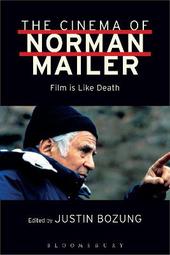
|
The Cinema of Norman Mailer: Film is Like Death
Hardback
Main Details
| Title |
The Cinema of Norman Mailer: Film is Like Death
|
| Authors and Contributors |
Edited by Justin Bozung
|
|
Contributions by Norman Mailer
|
| Physical Properties |
| Format:Hardback | | Pages:336 | | Dimensions(mm): Height 254,Width 178 |
|
| Category/Genre | Individual film directors and film-makers
Literary studies - from c 1900 - |
|---|
| ISBN/Barcode |
9781501325519
|
| Classifications | Dewey:791.430233092 |
|---|
| Audience | | Postgraduate, Research & Scholarly | |
|---|
| Illustrations |
83 bw illus
|
|
Publishing Details |
| Publisher |
Bloomsbury Publishing Plc
|
| Imprint |
Bloomsbury Academic USA
|
| Publication Date |
7 September 2017 |
| Publication Country |
United States
|
Description
The Cinema of Norman Mailer: Film is Like Death not only examines the enfant terrible writer's thoughts on cinema, but also features interviews with Norman Mailer himself. The Cinema of Norman Mailer also explores Mailer's cinema through previously published and newly commissioned essays written by an array of film and literary scholars, enthusiasts, and those with a personal, philosophical connection to Mailer. This volume discusses the National Book Award and Pulitzer Prize-winning author and filmmaker's six films created during the years of 1947 and 1987, and contends to show how Mailer's films can be best read as cinematic delineations that visually represent many of the writer's metaphysical and ontological concerns and ideas that appear in his texts from the 1950s until his passing in 2007. By re-examining Mailer's cinema through these new perspectives, one may be awarded not just a deeper understanding of Mailer's desire to make films, but also find a new, alternative vision of Mailer himself. Norman Mailer was not just a writer, but more: he was one of the most influential Postmodern artists of the twentieth century with deep roots in the cinema. He allowed the cinema to not only influence his aesthetic approach, but sanctioned it as his easiest-crafted analogy for exploring sociological imagination in his writing. Mailer once suggested, "Film is legitimately more interesting than books..." and with that in mind, readers of Norman Mailer might begin to rethink his oeuvre through the viewfinder of the film medium, as he was equally as passionate about working within cinema as he was about literature itself.
Author Biography
Justin Bozung is a researcher, writer, and part-time archivist, residing in Georgia, USA. He was a featured contributor at Shock Cinema and Videoscope magazines from 2010 to 2014. He has contributed to two books about Stanley Kubrick: 2001: The Lost Science (2013) and Studies in the Horror Film: Stanley Kubrick's The Shining (2015). Bozung serves on the board of the Norman Mailer Society and lectures about Mailer's films.
Reviews...this is an illuminating, long overdue reassessment of Mailer's cinematic endeavors. * Shock Cinema Magazine * You can bet there will never be another book on the films of Norman Mailer. This always intelligent look back at the despised movie career of this famously talented writer is made all the more astonishing by the collected essays' honesty, respect and attempt at historical context. Reading about these movies is way more fun than actually seeing them and even Norman might agree. * John Waters, Director and Screenwriter, USA * Bozung's collection represents a major advance in our understanding of Mailer's films-their origins, creation, reception, relationship to his literary work, and enduring influence. His assiduous archival work, communication with almost everyone alive involved with Mailer's filmmaking, the collection of previously published essays (including Mailer's), and the commissioning of new ones, plus an extraordinary collection of photographs, makes The Cinema of Norman Mailer the definitive volume on Mailer's film career. * J. Michael Lennon, author of Norman Mailer: A Double Life (2013) and Emeritus Professor of English, Wilkes University, USA *
|